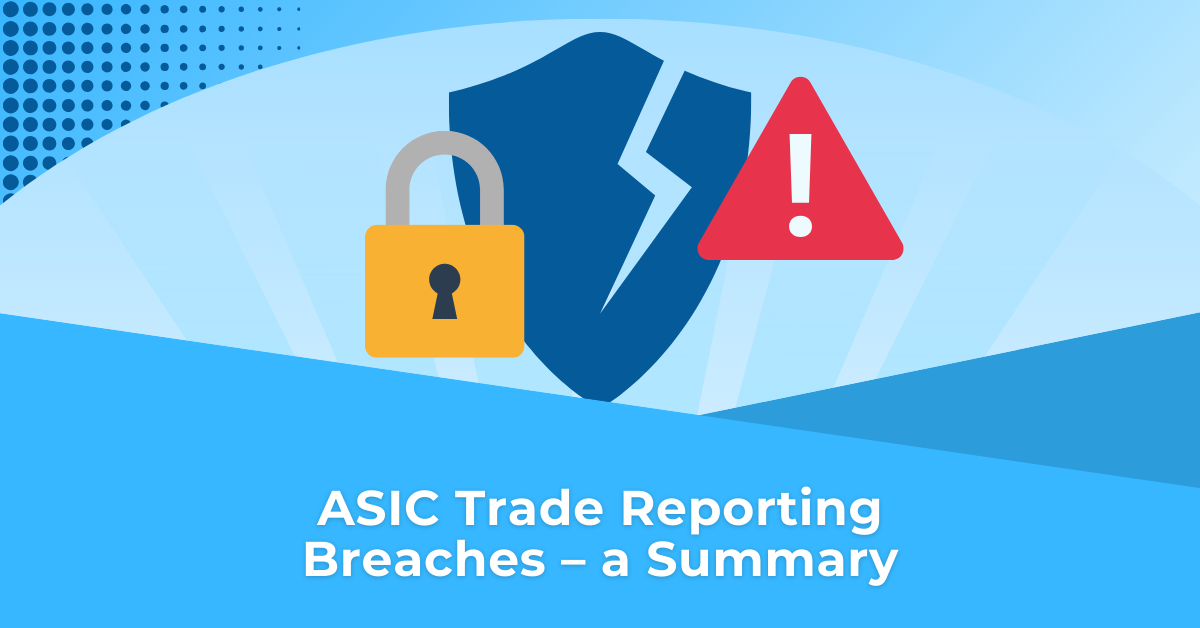Are you aware of the penalties for non-compliance with ASIC’s trade reporting rules? Australian entities dealing in OTC derivatives are required to report under and comply with the ASIC Derivative Transaction Rules (Reporting) 2024 (the Reporting Rules).
What can you be fined for?
You could be subject to penalty should you fail to comply with the following provisions of the Reporting Rules:
- Transaction Reporting Requirements and Position Reporting Requirements (2.2.1);
- Changes (2.2.2);
- Timing – generally T+2 (2.2.3);
- Format (i.e. applicable ISO 20022 message definition using XML tags) (2.2.4);
- Continuity of reporting (2.2.5);
- Accuracy of reporting (includes back reporting i.e. correcting errors and omissions) (2.2.6);
- Unique transaction identifiers (2.2.9);
- Keeping of records (2.3.1);
- Provision of records or other information (2.3.2);
- Reporting to Licensed Repositories (2.4.5); and
- Re-reporting (2.4.1).
Examples of ‘trade reporting’ specific breaches
We have categorised examples into breaches that may be a significant breach or may not be significant from ASIC’s RG 251 (effective 21 October 2024). In categorising which of these buckets the breach falls into, ASIC would look at the indicators of whether a reporting entity’s arrangements for compliance are adequate (and also takes into account the number/frequency of related breaches that have occurred):
Significant breach examples
Failure to:
- understand the Reporting Rules e.g. a trade repository treats a field as optional, however under the Reporting Rules this field must be completed.
- apply suitable controls/checks to change implementations leading to continuous errors.
- report terminated trades
Not Significant breach examples
- Isolated or one-off scenarios relating to:
late reporting. - incomplete reporting.
- errors regarding reporting accuracy.
ASIC Breach Reporting – General
If you hold an Australian Financial Services License (AFSL), you must report conduct which is a ‘reportable situation’ to ASIC where the situation arose on or after 1 October 2021. These include:
- a significant or likely significant breach of your ‘core’ (or general) AFSL obligations such as:
- conduct and disclosure;
- having competent, knowledgeable and skilled responsible managers and training of advisers and authorised representatives;
- provision of efficient, honest and fair financial services;
- having adequate financial, technological and human resources;
- complying with all financial services laws including compliance by your representatives;
- investigations of more than 30 days into a significant or likely significant breach of your ‘core’ AFSL obligation’ (including the outcome of such investigations even if no relevant breach has been determined to have occurred);
- serious fraud or gross negligence;
How much can you be fined?
Each penalty unit for breaching Australian Government laws is currently $313 and the maximum penalty for companies is the greater of:
- 50,000 penalty units (i.e. $15,650,000);
- 3 x the amount of the benefit obtained and detriment avoided; or
- 10% of the company’s annual turnover (but not greater than 2.5 million penalty units i.e. $782,500,000).
It is important to note that ASIC also has ‘administrative powers’, meaning they can suspend or cancel an Australian financial services licence should the scope of non-compliance warrant this type of action.
Who has breached the Reporting Rules?
In the past, major corporations Westpac, AMP Life and AMP Capital have faced hefty fines for breaching the Reporting Rules.
In 2017, ASIC issued the Westpac Banking Corporation a $127,250 fine for breaches made during the period 2013 to 2015. Westpac failed to report information about 112,556 Reportable Transactions contravening subrule 2.1.1(1).
In 2020, AMP Life and AMP Capital faced a combined total of $526,000.00 in fines. Like Westpac, both AMP entities failed to report all required information for Reportable Transactions during the period between 2015 and 2018. The entities had also failed to ensure that reporting information, whether reported by AMP or its delegate, remained complete, accurate and current at all times. As a result, ASIC issued infringement notices on the grounds of contravening subrules 2.1.1(1), 2.2.3(1) and 2.2.6.
How can you avoid this?
Past errors are still errors
As noted in ASIC’s cases against Westpac and both AMP entities, the breaches happened 4-5 years prior to the issuing of fines. You are still obliged to notify ASIC (and potentially perform remediation) of any and all trade reporting errors despite their date of occurrence.
Rectify errors in a timely manner
Given the delay between the breaches and infringement notices in the examples above, it can be assumed ASIC had a consultation and remediation interaction period with the entities before issuing the fines. If you find yourself in breach of the Reporting Rules, prioritise the actions needed to rectify errors as soon as practicable.
Review internal and outsourced systems and procedures
ASIC determined the extensive delay in the identification of reporting breaches, in AMP’s case, a result of “serious inadequacies in AMP’s internal and outsourced processes and procedures for monitoring the accuracy of its reporting”. Procedures to identify and fix errors are fundamental to effective and accurate trade reporting.
TRAction recommends regularly reviewing your internal reporting processes or reporting conducted by a delegated reporting service. Should you already outsource your reporting to a delegated third-party such as TRAction, you are required to conduct regular quality oversight of your reporting delegate as you are to take all reasonable steps to ensure that at all times, the completeness, accuracy and currency of the information reported. Note this is the case, even where you have no delegate to perform your trade reporting.
For more information on the lessons learned from the AMP Life and AMP Capital trade reporting breaches, read our previous article here.
Should you need advice regarding trade reporting breaches, please feel free to contact us.




